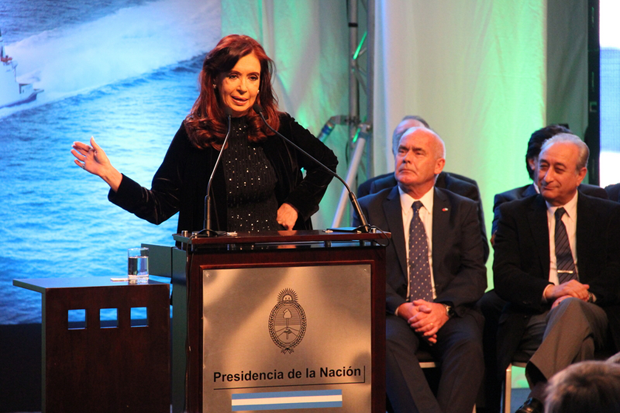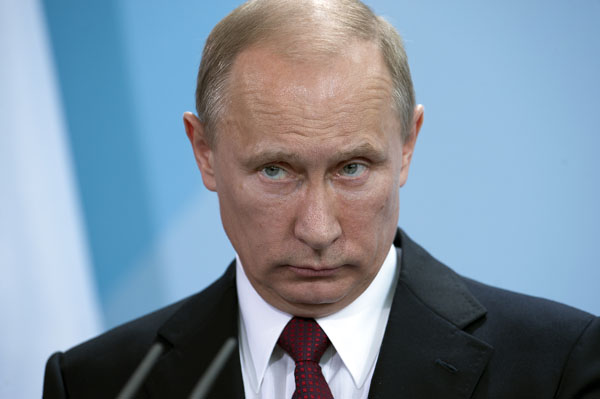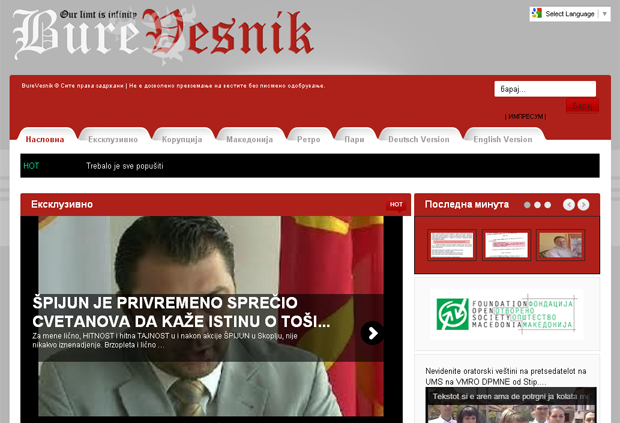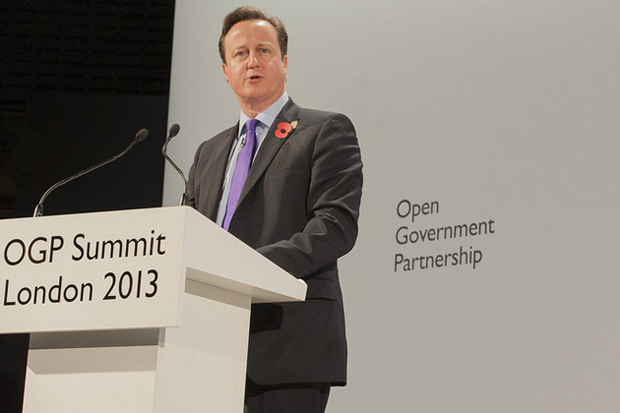11 Nov 2013 | Americas, News

While president Cristina Fernández de Kirchner’s government took a hit during midterm elections, Argentina’s supreme court ruled her restrictions on the country’s media were constitutional. (Photo: Claudio Santisteban / Demotix)
The Argentinian supreme court recently ruled to uphold the country’s controversial media law. The decision represents a big victory for President Cristina Fernández de Kirchner, who argued that the law helps break up the power concentrated in the hands of Argentina’s biggest media conglomerate Grupo Clarín. Opponents, however, says it stifles freedom of expression and press as it would force media companies to sell off some of their outlets. Concerns have also been raised about the law being a way of punishing Clarín, which fell out with the government after negative coverage during tax protests in 2008.
This is only the latest chapter in the ongoing story of the media business in some Latin American countries, with left wing governments and private companies locked in a decade-long fight for control of what will be shown on TV, heard on the radio, printed in newspapers, and posted on websites. New communications laws, persecution of journalists and closure of television networks, however, shows who is really in charge.
Governments like Venezuela and Argentina are waging war against big media companies, while more moderate ones, like Brazil, are using milder means to try and balance the power of communication in their countries. But far from being presented as a straightforward issue of freedom of expression, most of these cases have two opposing and radical interpretations.
On one side, there is the pro-government camp. They believe the governments are democratising the media, which has traditionally been in the hands of the few. In Brazil, for example, eight families control almost 80% of all traditional media companies. The aforementioned Grupo Clarín owns national and regional newspapers, radios, TV channels and more.
Those opposing these measures, however, say they amount to censorship. Again, a good example comes from Argentina: there are some rumours that Kirchner’s administration is trying to suffocate Grupo Clarín by not allowing big chain stores to advertise in their papers. There is also the infamous case of the the closure of Venezuela TV channel RCTVI in 2010.
Both sides talk of freedom of expression, arguing they want to show what is better for the public. But the public – those with the most to benefit from a good and transparent media – are not being allowed to decide for themselves. This is not happening just in Argentina and Venezuela, but across the continent – in Ecuador, Nicaragua and Bolivia, and, albeit in a much gentler way, in Brazil.
Professor Mirta Varela, specialist in history of the media at the University of Buenos Aires, is among those who believe governments are not repressing the big companies or trying to dominate the industry. “The measures taken have shown the political and economic power of the main companies, the spurious origin of their economic growth and their relationship with the dictatorship”, she explains, referencing Grupo Clarín and the military regimes that held power in almost all the Latin American countries from 1960 to 1980. But she also sees some problems with this polarisation: “There is a little room to set a new agenda; to make independent criticism, not overtly for or against the government.”
Cecilia Sanz works for Argentinian TV show “Bajada de línea”, which roughly translates to “Under the Line”. The show is hosted by Uruguayan Victor Hugo Morales, a well-known journalist connected to what Sanz calls “the progressive governments” in Latin America. Here she groups together a number of different left-leaning governments from across the continent – from moderates Lula da Silva and Dilma Rousseff in Brazil, to the more radical Evo Morales in Bolivia and Rafael Correa in Ecuador.
The show comments on the state of the media in Latin America, mainly arguing against the big private companies. “Our main goal is to put in context and show how the media owners have the intention, above all else, to accomplish their economic objectives,” she says. “The are using ‘freedom of expression’ as an excuse for this”. She mentions the case of powerful Mexican TV Azteca, which according to her, supports all the candidates from the hegemonic party PRI, and Chilean paper “El Mercurio”, which used to attack Chilean ex-president Salvador Allende in the 1970s – again putting very different cases in the same group.
The more radical of these “progressive governments” accuse the media industry of trying to destabilise the authorities or to encourage coups d’état. Venezuela’s putsch in 2002 is always mentioned. In this case factions of the media was directly fighting against Hugo Chávez – so Chávez took them off the air.
“This is an insult to the audience because in all of cases it is about the most popular media channels”, counters Claudio Paolillo, president of the freedom of press and expression commission of SIP, Sociedad Interamericana de Prensa (the Inter-American Press Society). “No one has put a gun to the audience’s head to force them to choose what to read, listen or watch, and on what channel.”
Paolillo says the government engages in “Goebbels’ style” propaganda, sustained by public resources, to oppress independent or critic media and journalists. He adds that, ironically, these radical “progressive governments” act like the conservative military regimes of the past. “It is an ideological posture. They want to nationalise communications media as if it was a regular business that offers services or products.”
Paolillo says SIP is against Latin Americas state-controlled monopolies or oligopolies, but reaffirms it is the audience that has the real power to decide what to watch, and where. If they want to watch the same news program, the government shall not interfere. “Unfortunately in Argentina as in Venezuela (and we must add here Ecuador, Nicaragua and Bolivia), governments have created their own media companies, expropriated and bought private ones – in some cases even working through a figurehead”, he complains.
Brazilian political scientist Mauricio Santoro brings up another common problem in the region – organised crime targeting reporters in Mexico and Colombia. But he says this is not a new situation. In his opinion, what is new, is “progressive governments” using the power of the state to control its opponents.
“The alternative proposed by these leftist governments is not based on the construction of an alternative model that privileges pluralism and gives a voice to social and community movements. It is about breaking business groups and giving power to a state press that acts like a government representative and not a public one.”
Worried about the poor quality of the media across Latin America, Santoro suggests the continent needs a more dynamic media, more capable of listening and understanding the true necessities of the people of a region going through “profound change”.
“Looking at the local scene”, he asks, “are we able to find any country where the traditional media meets this expectation?”
Not really.
This article was originally posted on 11 Nov 2013 at indexoncensorship.org
8 Nov 2013 | News, Russia

The United Nations got together yesterday to adopt a resolution calling for a world truce during the Winter Olympics kicking off in Sochi, Russia in exactly three months. This has become a tradition over the past 20 years — a symbolic gesture in the months leading up to the games. For the first time, however, it called upon the host country to “promote social inclusion without discrimination of any kind.”
Obviously a thinly veiled reference to the overtly anti-LGBT legislation Russia passed back in June. The vaguely worded ban on “gay propaganda” aimed at minors has sparked outrage across the world, with some activists calling for a boycott of the games.
But have no fear — Sochi Games chief Dmitry Chernyshenko, present at the UN, reminded us all that President Putin has repeated “three times” that there will be “no discrimination”.
THREE TIMES, YOU GUYS.
While you will forgive me for reserving my judgment on that particular guarantee for now, it is worth noting what was not mentioned in the resolution and what we were not given any assurance about. The right to freedom expression — or rather lack thereof — stands at the core of this issue. Since the law came into power, LGBT protesters have been attacked and arrested. Authorities have warned that spectators and athletes can be fined for “gay propaganda”, like displaying rainbow flags.
I don’t know about you, but to me that seems to fly in the face of the the universal human right to freedom of expression and assembly. But maybe it was simply an oversight, and this is next on the agenda. In which case, I’ve got a few suggestions on where to start.
For one, there are currently 28 Greenpeace activists and two journalists under arrest in Russia. They were staging a peaceful protest by a Gazprom oil rig on September 18, when their ship was boarded by Russian security forces. They are currently detained in a prison in St Petersburg. Initially held on piracy charges with a potential 15 year sentence, they have now been downgraded to hooliganism. This could still mean up to seven year in jail. Again, that’s for a peaceful protest.
Then there’s the case of the TV crew from the Norway’s Olympic broadcaster TV2. While filming a recent report in Sochi, they were taken into custody, interrogated, harassed and denied contact with the Norwegian embassy. The journalists were also told that they were now ‘blacklisted’. Not very encouraging to hear if you’re a critical foreign reporter heading to Sochi in February, never mind a member Russia’s perpetually repressed independent press.
And of course, you can’t talk about freedom of expression in Russia without mentioning Pussy Riot. Two members of the feminist punk group have been in prison since February 2012. The latest news was the apparent disappearance of Nadezhda Tolokonnikova as she was moved between prisons. This came after the Guardian published an open letter where she detailed the horrible conditions they were being held under. It soon emerged that she might be, like in some sort of Soviet nightmare, sent to Siberia.
One of the fundamental principles of the Olympics deals with “preserving human dignity”, and there is no doubt that freedom of expression is a pretty big part of that. Rather than listening to Putin’s empty promises, we should be measuring up Russia’s commitment to “human dignity” where it counts.
This article was originally posted on 7 Nov 2013 at PolicyMic.com
8 Nov 2013 | Europe and Central Asia, Macedonia, News

Zoran Bozinovski, the owner of website Burevesnik, was arrested Thursday night in Novi Sad, Serbia. Bozinovski is charged with foreign espionage and criminal association.
Burevesnik is known for its critical coverage of the Macedonian government, led by Prime Minister Nikola Gruevski.
Macedonian authorities accuse Bozinovski of being part of a spy-ring working for a foreign government. He has previously denied the charges, telling Macedonian independent news site NOVA TV in September that “all the information that I gather I publicly declare my website Burevesnik.” He now faces 30 days in detention and extradition to Macedonia.
This comes only a day after journalist Tomislav Kezarovski was released from prison and put under house arrest. He was sentenced to four and half years in jail in October for reporting on the identity of a witness in a murder trial in 2008. The sentence came under criticism both nationally and internationally, with OSCE Media Freedom Representative Dunja Mijatovic declaring it had “serious consequences for free expression and media freedom” in the country.
Press freedom in Macedonia has been deteriorating for some time, with repressive legislation and increased hostility towards critical press from the government. The country ranks 116th out of 179 countries in the 2013 Reporters Without Borders press freedom index.
This article was originally posted on 8 Nov 2013 at indexoncensorship.org
1 Nov 2013 | News, United Kingdom

State control of the press is hot topic. On Wednesday, Queen Elizabeth signed off a Royal Charter which gives politicians a hand in newspaper regulation. This come after David Cameron criticised the Guardian’s reporting on mass surveillance, saying “If they don’t demonstrate some social responsibility it will be very difficult for government to stand back and not to act”.
But what does state control of the press really look like? Here are 10 countries where the government keeps a tight grip on newspapers.
Bahrain
Press freedom ranking: 165
The tiny gulf kingdom in 2002 passed a very restrictive press law. While it was scaled back somewhat in 2008, it still stipulates that journalists can be imprisoned up to five years for criticising the king or Islam, calling for a change of government and undermining state security. Journalists can be fined heavily for publishing and circulating unlicensed publications, among other things. Newspapers can also be suspended and have their licenses revoked if its ‘policies contravene the national interest.’
Belarus
Press freedom ranking: 157
In 2009 the country known as Europe’s last dictatorship passed the Law on Mass Media, which placed online media under state regulation. It demanded registration of all online media, as well as re-registration of existing outlets. The state has the power to suspend and close both non-registered and registered media, and media with a foreign capital share of more than a third can’t get a registration at all. Foreign publications require special permits to be distributed, and foreign correspondents need official accreditation.
China
Press freedom ranking: 173
The country has a General Administration of Press, Publication, Radio, Film and Television and an army official censors dedicated to keeping the media in check. Through vaguely worded regulation, they ensure that the media promotes and toes the party line and stays clear of controversial topics like Tibet. A number of journalists have also been imprisoned under legislation on “revealing state secrets” and “inciting subversion.”
Ecuador
Press freedom ranking: 119
In 2011 President Rafael Correa won a national referendum to, among other things, create a “government controlled media oversight body”. In July this year a law was passed giving the state editorial control and the power to impose sanctions on media, in order to stop the press “smearing people’s names”. It also restricted the number of licences will be given to private media to a third.
Eritrea
Press freedom ranking: 179
All media in the country is state owned, as President Isaias Afwerki has said independent media is incompatible with Eritrean culture. Reporting that challenge the authorities are strictly prohibited. Despite this, the 1996 Press Proclamation Law is still in place. It stipulates that all journalists and newspapers be licensed and subject to pre-publication approval.
Hungary
Press freedom ranking: 56
Hungary’s restrictive press legislation came into force in 2011. The country’s media outlets are forced to register with the National Media and Infocommunications Authority, which has the power to revoke publication licences. The Media Council, appointed by a parliament dominated by the ruling Fidesz party, can also close media outlets and impose heavy fines.
Saudi Arabia
Press freedom ranking: 163
Britain isn’t the only country to tighten control of the press through royal means. In 2011 King Abdullah of Saudi Arabia amended the media law by royal decree. Any reports deemed to contradict Sharia Law, criticise the government, the grand mufti or the Council of Senior Religious Scholars, or threaten state security, public order or national interest, are banned. Publishing this could lead to fines and closures.
Uzbekistan
Press freedom ranking: 164
The Law on Mass Media demands any outlet has to receive a registration certificate before being allowed to publish. The media is banned from “forcible changing of the existing constitutional order”, and journalists can be punished for “interference in internal affairs” and “insulting the dignity of citizens”. Foreign journalists have to be accredited with the Ministry of Foreign Affairs.
Vietnam
Press freedom ranking: 172
The 1999 Law on Media bans journalists from “inciting the people to rebel against the State of the Socialist Republic of Vietnam and damage the unification of the people”. A 2006 decree also put in place fines for journalists that deny “revolutionary achievements” and spread “harmful” information. Journalists can also be forced to pay damages to those “harmed by press articles”, regardless of whether the article in question is accurate or not.
Zimbabwe
Press freedom ranking: 133
The country’s Access to Information and Protection of Privacy Act gives the government direct regulatory power over the press through the Media and Information Council. All media outlets and journalists have to register with an obtain accreditation from the MIC. The country also has a number of privacy and security laws that double up as press regulation, The Official Secrets Act and the Public Order and Security Act.
This article was originally posted on 1 Nov 2013 at indexoncensorship.org.




